Deutsche Bank Bundle
How Does Deutsche Bank Thrive in the Global Financial Arena?
Deutsche Bank, a titan in the financial world, commands a significant presence across the globe, offering a wide array of financial services to a diverse clientele. Its operations are complex, spanning continents and serving everyone from individual investors to multinational corporations. Understanding Deutsche Bank SWOT Analysis is crucial for anyone seeking to navigate the intricacies of the global financial landscape.
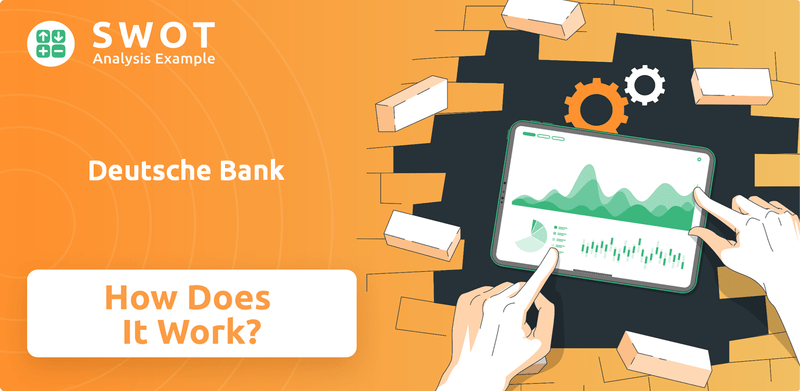
This exploration into how Deutsche Bank works will dissect its core functions, revealing how this global bank generates revenue and maintains its position. We'll examine its investment banking divisions, wealth management services, and digital banking offerings, providing insights into its financial performance analysis and strategic moves. By understanding Deutsche Bank's role in the global economy and its risk management strategies, you'll gain a comprehensive view of this financial powerhouse.
What Are the Key Operations Driving Deutsche Bank’s Success?
Understanding Deutsche Bank involves examining its core operations and value proposition. The bank creates value by offering a wide array of financial services to various client segments globally. Its operational framework is supported by a strong technological infrastructure and a vast network of branches and offices worldwide, enabling it to deliver comprehensive financial solutions.
Deutsche Bank's primary offerings include investment banking, commercial and retail banking, transaction banking, and asset management. These services cater to corporations, governments, institutional investors, small and medium-sized businesses, and private individuals. The bank's global footprint and integrated service model allow it to tailor solutions to meet specific client needs, thus creating significant customer benefits and market differentiation.
The bank's operations are underpinned by a robust technological infrastructure and a vast network of branches and offices worldwide, ensuring broad client reach. Strategic partnerships with fintech companies and other financial institutions enhance its service offerings and digital capabilities. Deutsche Bank's unique operational effectiveness stems from its deep sector expertise and global presence.
Investment banking at Deutsche Bank provides advisory services for mergers and acquisitions, capital markets solutions (equity and debt issuance), and sales and trading of various financial instruments. This division is crucial for corporate clients seeking to raise capital or execute strategic transactions. In 2024, the global M&A market saw significant activity, with Deutsche Bank playing a key role in several high-profile deals.
Commercial and retail banking focuses on deposits, loans, and payment services for individuals and businesses. This segment provides essential services to a broad customer base, supporting everyday financial needs. The bank continues to invest in digital platforms to enhance customer experience and operational efficiency. As of late 2024, digital banking adoption rates are steadily increasing.
Transaction banking offers cash management, trade finance, and securities services, facilitating global commerce. This segment is vital for businesses engaged in international trade, providing essential services to manage cross-border transactions. The bank's transaction banking arm saw a rise in revenue in 2024, reflecting increased global trade volumes.
Asset management involves managing investment portfolios for institutional and individual clients across diverse asset classes. This segment offers a range of investment products and services, catering to various risk profiles and financial goals. In 2024, the asset management division focused on sustainable investment strategies, aligning with growing investor demand.
Deutsche Bank's operational effectiveness stems from its deep sector expertise, global footprint, and integrated service model. This allows the bank to deliver comprehensive financial solutions tailored to client needs, creating significant customer benefits and market differentiation. The bank's supply chain involves sourcing financial capital from depositors and institutional investors, which is then deployed through lending, investment, and trading activities.
- Global Network: Extensive network of branches and offices worldwide.
- Digital Platforms: Enhanced digital capabilities for improved customer experience.
- Strategic Partnerships: Collaborations with fintech companies to expand service offerings.
- Risk Management: Robust strategies to manage financial risks effectively.
Deutsche Bank SWOT Analysis
- Complete SWOT Breakdown
- Fully Customizable
- Editable in Excel & Word
- Professional Formatting
- Investor-Ready Format
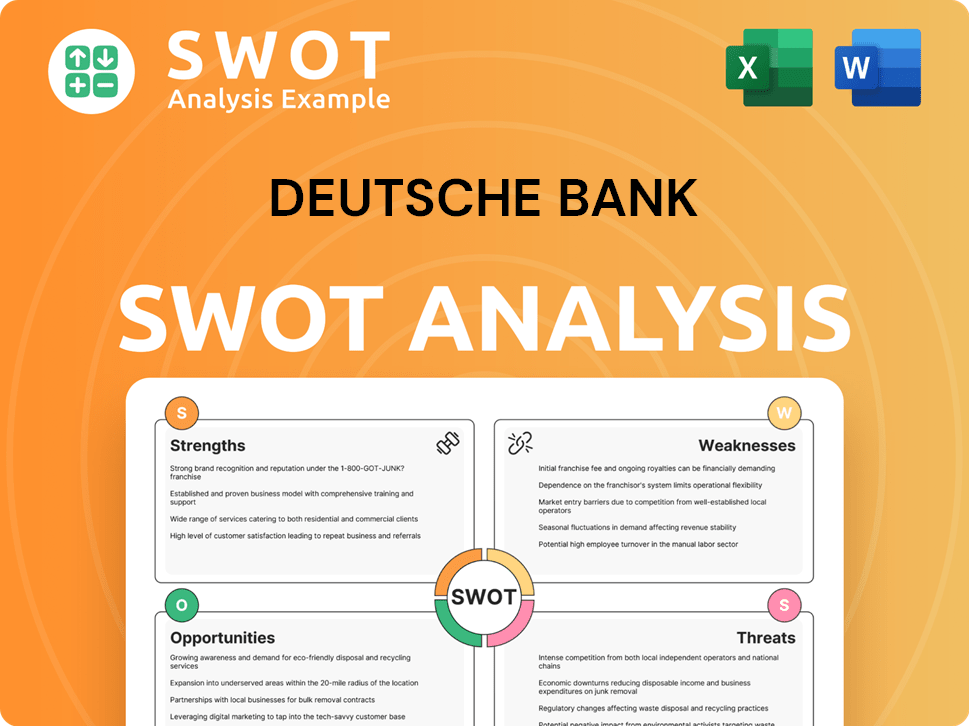
How Does Deutsche Bank Make Money?
Deutsche Bank, a prominent global bank, generates revenue through a diverse array of financial services. Its revenue streams are primarily categorized into net interest income, net commission income, and net trading income. These streams reflect the bank's extensive operations across various sectors, including investment banking and wealth management.
The bank's financial performance in the first quarter of 2025 highlights its revenue generation capabilities. Deutsche Bank reported a net profit of €1.3 billion, demonstrating its continued profitability and operational efficiency. This financial success is driven by key divisions such as the Corporate Bank, Investment Bank, and Private Bank.
The revenue mix is influenced by regional dynamics and business segments, with investment banking often more prominent in developed markets. The bank focuses on diversifying its revenue base, emphasizing fee-based income to reduce reliance on interest rate fluctuations and market volatility. For more insights, consider exploring the Growth Strategy of Deutsche Bank.
Deutsche Bank employs several strategies to monetize its services and generate revenue. These include platform fees for digital services and bundled offerings for corporate clients.
- Net Interest Income: This is the difference between interest earned on assets (like loans) and interest paid on liabilities (like deposits).
- Net Commission Income: Revenue from fees for asset management, transaction banking, and advisory services.
- Net Trading Income: Income from trading activities in fixed income, currencies, and equities.
- Cross-selling: Offering services from different divisions to clients, such as investment banking clients using transaction banking services.
- Tiered Pricing: Wealth management services are often priced based on assets under management.
Deutsche Bank PESTLE Analysis
- Covers All 6 PESTLE Categories
- No Research Needed – Save Hours of Work
- Built by Experts, Trusted by Consultants
- Instant Download, Ready to Use
- 100% Editable, Fully Customizable
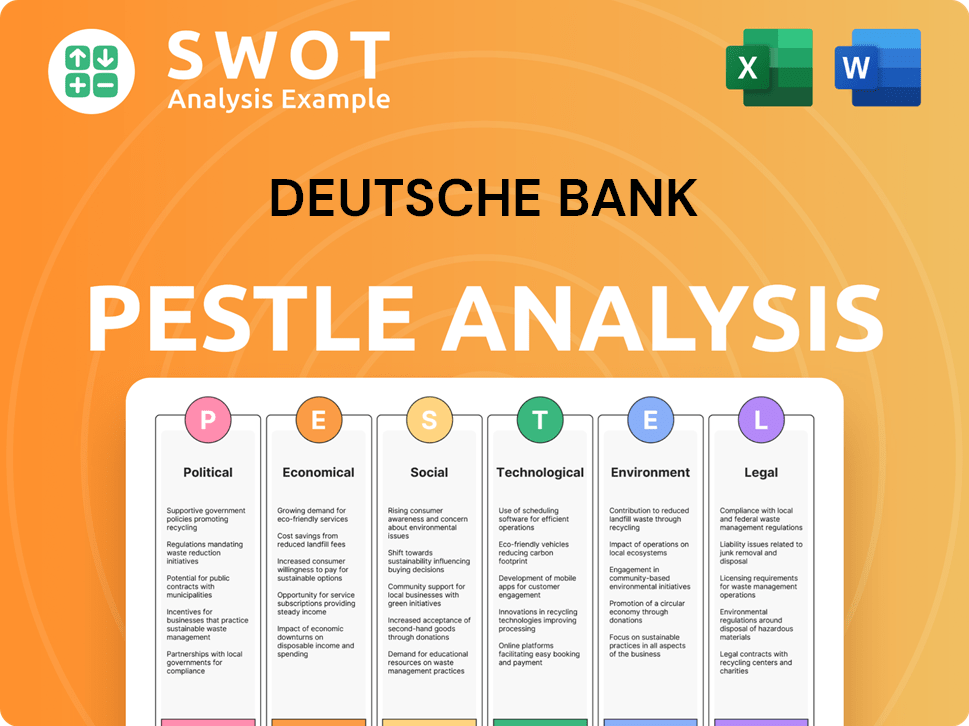
Which Strategic Decisions Have Shaped Deutsche Bank’s Business Model?
Deutsche Bank, a prominent player in the financial services sector, has a rich history marked by significant milestones and strategic shifts. Its journey reflects the evolving dynamics of the global financial landscape, including periods of expansion, challenges, and adaptation. The bank’s operations are structured to provide a wide array of financial services, catering to diverse client needs across different markets.
A key strategic move in recent years has been the ongoing transformation program. This initiative aims to streamline operations, reduce costs, and enhance profitability. The program includes divesting non-core assets and focusing on core strengths in investment banking, corporate banking, and private banking. This strategic shift is crucial for navigating the complexities of the modern financial environment.
The bank has also invested heavily in technology and digitalization to improve operational efficiency and enhance the client experience. These investments are vital for staying competitive in an industry increasingly driven by technological innovation. Furthermore, Deutsche Bank's resilience is evident in its financial performance, such as the net profit of €1.3 billion in the first quarter of 2025, showcasing the positive impact of its strategic initiatives.
Deutsche Bank's history is marked by key milestones, including its founding in 1870 and subsequent expansions. The bank has grown through strategic acquisitions and organic growth. It has navigated various financial crises and economic cycles, adapting its strategies to maintain its position in the global market.
Recent strategic moves include a major transformation program to streamline operations and reduce costs. The bank has focused on its core strengths in investment banking, corporate banking, and private banking. Investments in technology and digitalization are also a key focus to improve efficiency and enhance client services.
Deutsche Bank's competitive advantages include its strong brand strength, global reach, and deep client relationships. Technological leadership in transaction banking and digital platforms provides a significant edge. Economies of scale allow for competitive pricing and significant infrastructure and talent investments.
Challenges include navigating a low-interest-rate environment and addressing regulatory hurdles. The bank has responded by strengthening risk management frameworks and investing in compliance. Digital innovation is also a key strategy to remain competitive, as highlighted in the Growth Strategy of Deutsche Bank.
Deutsche Bank benefits from a strong brand, global presence, and established client relationships. Its technological advancements in transaction banking and digital platforms offer a competitive edge. Economies of scale enable competitive pricing and significant investments in infrastructure and talent. The bank's focus on sustainable finance and digital banking solutions further enhances its market position.
- Strong Brand and Global Reach: A well-recognized brand with a global presence.
- Technological Leadership: Advanced digital platforms and transaction banking services.
- Client Relationships: Deep relationships with large corporations and institutional investors.
- Economies of Scale: Enables competitive pricing and significant investments.
Deutsche Bank Business Model Canvas
- Complete 9-Block Business Model Canvas
- Effortlessly Communicate Your Business Strategy
- Investor-Ready BMC Format
- 100% Editable and Customizable
- Clear and Structured Layout
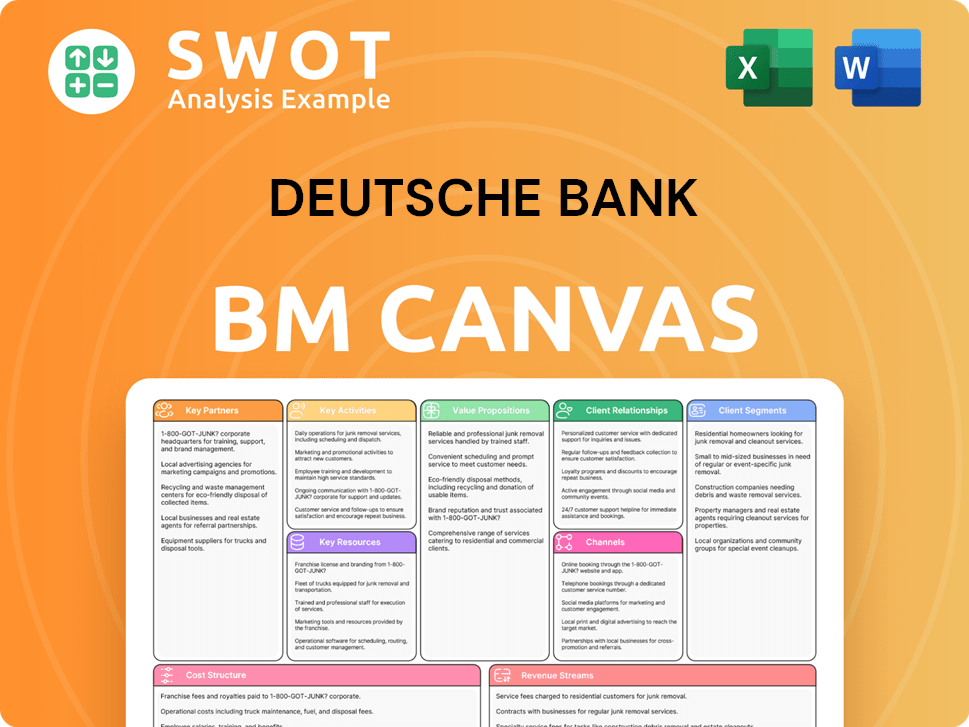
How Is Deutsche Bank Positioning Itself for Continued Success?
Deutsche Bank holds a prominent position in the global financial industry, functioning as a leading universal bank. Its operations span across investment banking, financial services, and wealth management, with a significant international presence. The institution's diverse services and extensive network contribute to its customer loyalty and broad market reach, solidifying its role in the global economy.
However, Deutsche Bank faces several challenges, including regulatory scrutiny and competition from both traditional and fintech firms. Technological advancements and changing consumer preferences demand continuous adaptation. Geopolitical instability and macroeconomic uncertainties also pose risks to its performance. For a deeper understanding of the bank's target market, explore the target market of Deutsche Bank.
Deutsche Bank ranks among the top global banks, with a strong presence in transaction banking and corporate finance. Its international reach and established client base support its competitive standing. The bank's history and structure have enabled it to provide a wide range of services for businesses and individuals.
Regulatory changes and increased competition are major concerns. Technological disruption and evolving consumer expectations require constant adaptation. Geopolitical risks and economic uncertainties can significantly impact the bank's financial performance. Risk management strategies are essential to mitigate these challenges.
Deutsche Bank is focusing on cost optimization, growth in sustainable finance, and digital transformation. Leadership is committed to disciplined execution and profitable growth. The bank aims to leverage its strengths and capitalize on new technologies for sustained financial results.
In 2024, Deutsche Bank reported a net revenue of approximately €28.7 billion. The bank's Common Equity Tier 1 (CET1) capital ratio stood at around 13.7%, indicating a solid capital position. The bank has been actively managing its risk profile and navigating the evolving financial landscape. The bank's digital banking offerings continue to expand.
Deutsche Bank's strategic initiatives include streamlining its cost base and investing in growth areas such as sustainable finance. The bank is also focused on enhancing its digital capabilities and expanding its presence in key markets. These efforts aim to improve the bank's overall performance and deliver value to shareholders.
- Cost Optimization: Reducing operational expenses to improve profitability.
- Digital Transformation: Investing in technology to enhance customer experience and efficiency.
- Sustainable Finance: Expanding its role in sustainable and green finance initiatives.
- Market Expansion: Targeting growth in key markets and new financial technologies.
Deutsche Bank Porter's Five Forces Analysis
- Covers All 5 Competitive Forces in Detail
- Structured for Consultants, Students, and Founders
- 100% Editable in Microsoft Word & Excel
- Instant Digital Download – Use Immediately
- Compatible with Mac & PC – Fully Unlocked
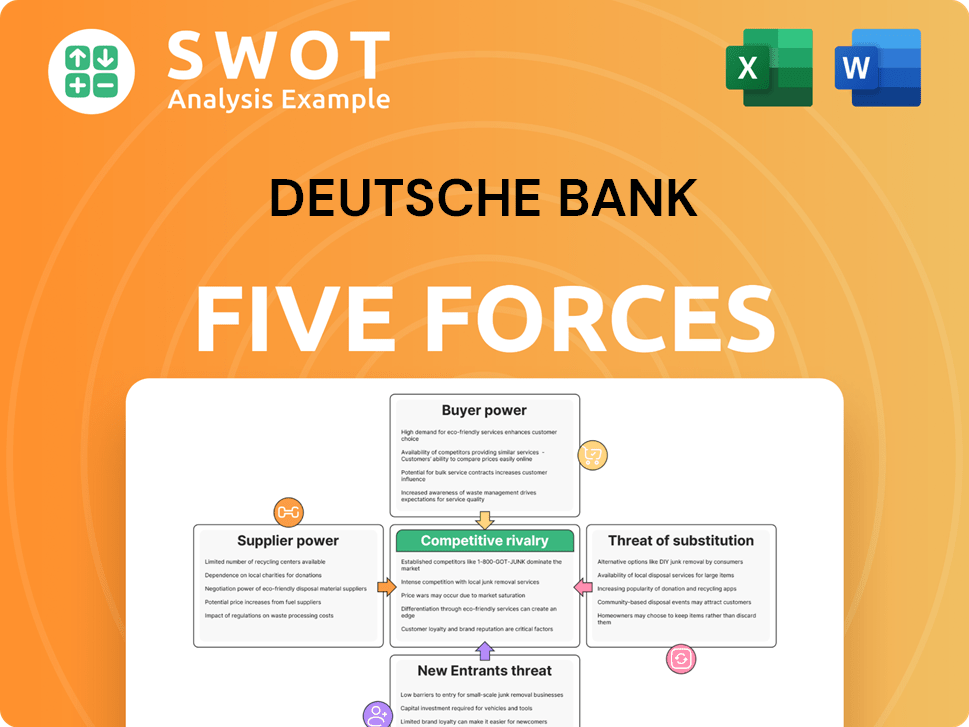
Related Blogs
- What are Mission Vision & Core Values of Deutsche Bank Company?
- What is Competitive Landscape of Deutsche Bank Company?
- What is Growth Strategy and Future Prospects of Deutsche Bank Company?
- What is Sales and Marketing Strategy of Deutsche Bank Company?
- What is Brief History of Deutsche Bank Company?
- Who Owns Deutsche Bank Company?
- What is Customer Demographics and Target Market of Deutsche Bank Company?
Disclaimer
All information, articles, and product details provided on this website are for general informational and educational purposes only. We do not claim any ownership over, nor do we intend to infringe upon, any trademarks, copyrights, logos, brand names, or other intellectual property mentioned or depicted on this site. Such intellectual property remains the property of its respective owners, and any references here are made solely for identification or informational purposes, without implying any affiliation, endorsement, or partnership.
We make no representations or warranties, express or implied, regarding the accuracy, completeness, or suitability of any content or products presented. Nothing on this website should be construed as legal, tax, investment, financial, medical, or other professional advice. In addition, no part of this site—including articles or product references—constitutes a solicitation, recommendation, endorsement, advertisement, or offer to buy or sell any securities, franchises, or other financial instruments, particularly in jurisdictions where such activity would be unlawful.
All content is of a general nature and may not address the specific circumstances of any individual or entity. It is not a substitute for professional advice or services. Any actions you take based on the information provided here are strictly at your own risk. You accept full responsibility for any decisions or outcomes arising from your use of this website and agree to release us from any liability in connection with your use of, or reliance upon, the content or products found herein.